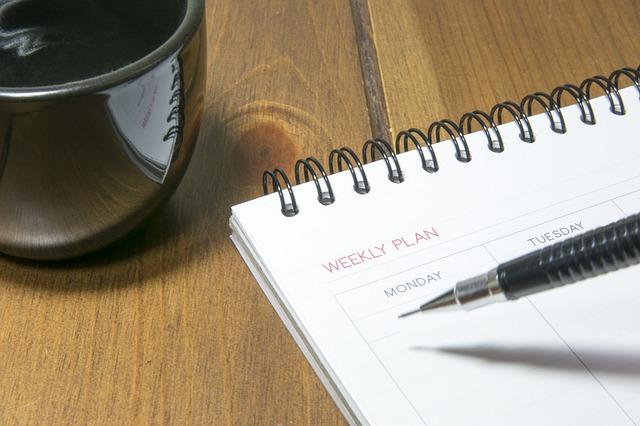- April 3, 2017
- Emily Vyverberg, PharmD, Staff Pharmacist
- Healthy Living

We all deal with stress in our everyday lives. It affects everyone from time to time. There are different types of stress and each type affects people differently. Additionally, some people have a better ability to cope with stress than others.
If stress is not properly managed, it can have negative effects on your physical and mental health. With these tips, you will be able to manage your stress much more effectively.
Make Stress Management a Priority
In order to successfully manage stress, you must first have the correct mindset. Stress isn’t something you can put on the back burner and hope it goes away.
It takes a concentrated effort and that starts with making stress management a priority.
Monitor Stress Effectively
Pay attention to physical and mental changes that may occur as a result of stress. It is important to be aware of periods of high stress so that you can implement stress management strategies early and often.
Some mental changes include loss of attention span, mood swings, and an overall negative outlook on life. Bodily changes may include spikes in blood pressure and frequent stomach aches.
Make Note of Periods of Low Stress

While it is essential to be aware of periods of high stress, the importance of paying attention to low-stress periods should not be overlooked.
Knowing when you are the least stressed will allow you to return to that state more quickly during stressful times. Think of it as “finding your happy place.”
Identify What Triggers Your Stress
Stress triggers will vary from person to person. If you can pinpoint exactly what causes your stress, it will make it that much easier to deal with.
Recognize What You Can/Can’t Control
Sometimes, stress is caused by things beyond our control. This often has to do with illness or death of loved ones.
Realizing that there are certain situations you can’t control will make those situations less stressful.
Engage In Calm Activities (yoga, going for a walk, etc.)
Calm, peaceful activities naturally put the body and mind at ease. Set aside some time during the day to go for a quick walk or just sit on a park bench.
Even a couple minutes of relaxation time will provide a much-needed break from the hassles of everyday life.
Get Enough Sleep
Many people have problems with getting enough sleep at night. This can directly contribute to stress levels.
A good way to make sure you get enough sleep is to have a consistent sleep schedule. This is achieved by going to bed and waking up at the same time every day.
It is also helpful to make sure the sleep you get is quality sleep. Do this by avoiding screens (television, phone, computer) for 30 minutes before bed. Read a book instead.
Exercise Regularly

Frequent exercise leads to improved overall health. Stress management is no different. During exercise, the body releases hormones that help to reduce stress.
You don’t have to run marathons in order for this to be effective.
Even 30 minutes of light exercise, such as walking, will help.
Maintain a Balanced Diet
Keeping a balanced diet has a variety of health benefits that aren’t just limited to stress. Consider cutting back on sugar & incorporating more vegetables into your diet.
Check out our blog post about green vegetables if you haven’t already.
Avoid Negativity
This may seem like it is easier said than done. It really has to do with how you approach your day-to-day life.
If you visualize the day having positive outcomes, those positive outcomes will become more likely to happen. In turn, it will have a positive impact on your overall stress level.
Cut Back on Caffeine and Alcohol
Caffeine and alcohol can both negatively interfere with sleep patterns. On top of that, excessive caffeine and alcohol consumption can both lead to increased levels of stress.
It’s best to consume both either in moderation or not at all, even if that means gradually cutting back over time.
Don’t Use Unhealthy Behaviors as Coping Mechanisms (drugs, alcohol, overeating)
Using drugs and alcohol to cope with stress will often have the opposite effect. Abusing drugs or alcohol usually just masks the problem temporarily until it comes back even worse.
Also, substance abuse can lead to severe health problems, which are a known cause of stress.
Don’t be Afraid to Ask Family/Friends for Help
Loved ones can be an extremely valuable resource during tough times. Don’t hesitate to reach out to family or friends and ask for help if you need it.
Any friend worth having will be more than willing to help out.
Maintain Personal Relationships
Continuing with the theme of family and friends, make sure to maintain your personal relationships.
This can be as simple as making a phone call to a friend you haven’t spoken to in a while. Oftentimes, simply catching up with an old friend can give you the lift in spirits you’ll need.
Be Consistent
Stress management is not a one-off occurrence. Stressful situations can pop up at any given time, even when you least expect them.
It’s best to be mindful of this and try to anticipate stressful situations before they happen.
Meditate

That’s right; you don’t have to be a Buddhist monk in order to practice meditation. Keep an open mind and give it a try. You might be amazed at the results.
Start with a couple minutes at a time and work your way up from there. There are a number of resources available online if you aren’t sure where to start.
Talk to a Doctor or Pharmacist
If your stress becomes severe and long-lasting, talk to a doctor or pharmacist. A doctor will provide you with the best resources and the best course of action based on your individual needs.
Doctors and pharmacists will also help manage the physical side effects of stress, such as high blood pressure.
Plan Ahead
Have you ever felt overwhelmed by a work assignment or an event in your personal life because it “snuck up on you”? Failure to plan ahead can cause these things to build up over time and cause undue stress.
While unexpected stressful situations will always happen, this is a way to ensure that avoidable stressful situations can be dealt with ahead of time.
Manage Your Time Wisely

Branching off of the last tip, enhance your time management skills. This extends well beyond simply managing your time more efficiently at work.
Set aside some free time to work on a hobby or exercise. You’ll see some major benefits if you simply dedicate 30 minutes of your day to some type of relaxation.
Deep Breathing
This is one of the oldest tricks in the book, and there’s a reason for that.
Deep breathing has been proven to reduce the physical side effects of stress. It lowers the heart rate and relaxes the muscles.
Take Up a New Hobby and Make Time for It
Learning a new hobby can be a fun and rewarding way to relieve stress.
Leisure hobbies like listening to music or playing an instrument work best, but most hobbies will work just fine.
Take Some Time to Laugh
This may seem obvious to some, but you’d be surprised at the amount of people who don’t realize the power of a good laugh. Laughing actually physically causes the body to release endorphins (feel-good hormones) and decrease stress hormones.
In this case, laughter actually can be some of the best medicine. Take some time to watch a comedy every once in a while.
Separate Work Life and Personal Life
If at all possible, try to make sure your work-related stressors (causes of stress) stay at work. Time spent at home should be dedicated to unwinding and relaxing, not dealing with work issues.
This may be difficult for some, but simply making an effort is a step in the right direction.
Read a Book

Reading is without a doubt one of the best ways to relax. Not only does it clear the mind of worries, it also improves attention span.
Reading lets you learn while you relax. Does it get much better than that?
Take Breaks from Work
Work-related issues are the most common cause of stress in Americans. Working for long stretches at a time can cause burnout and add to your stress.
Give yourself a short 5-10 minute break every few hours to re-calibrate and take your mind off work.
Walk Away from Stressful Situations When Possible
Typically, you’re not doing yourself any favors when you stay in the middle of a stressful situation. If you can, take a step back to regroup.
This will give you a fresh perspective and cut down on your overall stress.
Cut Back on Technology & Social Media Use
According to this article from the American Psychology Association, people who frequently check their electronic devices experience higher levels of stress than those who don’t.
If you can, try to keep the amount of times you check your phone to a minimum.
Some people do what is called a "digital detox", which means going without electronic devices for as long as possible.
Don’t Take on More Than You Can Handle
This applies to both work life and home life. If you already have plenty of things to do, it’s ok to refuse to take on more projects. It may be difficult at first, but learn how to say ‘no’.
Being a little more assertive will boost your self-confidence and limiting your workload will reduce feelings of being overwhelmed.
Where to Go From Here
Some of these stress management techniques are quick fixes and others will take time to master.
The first step is to understand the impact stress can have and realize why it’s so important to take steps to minimize stress. After that, the rest of this stuff will fall into place.
Sources:
http://www.mayoclinic.org/healthy-lifestyle/stress-management/basics/stress-basics/hlv-20049495?p=1
https://hbr.org/2009/03/monitor-and-manage-your-stress







